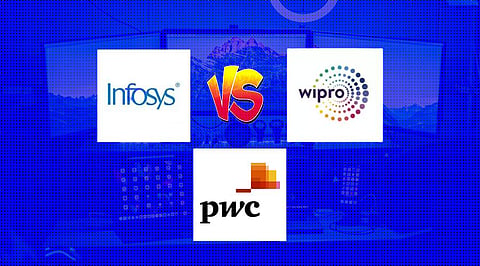

The debate around great Corporate WFH or WFO or hybrid model has one central issue at the crux i.e., proximity bias. Proximity bias refers to giving preference to people, locations, or situations that we are exposed to regularly. While companies prefer a complete work-from-office strategy, burned-out employees vouch for Work from home option. It's not black and white when it comes to implementing WFH or a hybrid model, each having its own merits and demerits. Developers in particular would beg for some discretion for the focus and not-so-frequent human interactions required unless they do not have issues with lack of 'visibility' from either side, irrespective of the Wipro Vs Infosys Vs Pwc perspective. The 2022 State of Remote Engineering Report aimed at studying the work experience of software developers, states appetite for remote working remains high among developers.
Zoom meetings definitely do not work for a certain group of employees, particularly when it is about spontaneous short-term tasks but it is something a hardcore developer has to least bother about. That doesn't mean it should be mandatory for everyone to fall in line. While Corporate companies have learned this fact hard, at least after witnessing the Big Quit after Covid-19, moonlighting has exposed the other side of WFH practice which again had the opinion divided only to inspire the strict implementation of work from office or hybrid work model.
In spite of all the drill and dust, these companies are into posting openings for WFH developers. While the reason why they are doing so is a topic for another discussion, it is necessary to know what a prospective developer can expect from the job before applying for it. Taking into consideration the WFH experience of employers at Infosys, Pwc, and Wipro it is highly recommended that one prefers Pwc over the other two. As per LinkedIn surveys, Pwc offers maximum flexibility with 61% of employers responding positively, whereas for Infosys and Wipro the numbers stand at 52% and 49%. At the end of the day, any job profile that requires thinking out of the box, without a doubt needs flexibility. Pwc, over time, pivoted on this sole factor has built a successful remote working model that helped to make it to Fortune's 100 Best Companies to Work For list 16 years in a row.
Infosys and Wipro, the trailing companies on the flexibility index, apparently don't have that good record of supporting WFH culture. Infosys CEO Narayana Murthy has openly expressed their aversion towards remote work, implementing a hybrid model only as a transition strategy. "When people work from home, that institutional culture will slowly become weaker and weaker," said Murthy at a Deccan Herald event in April kicking up the whole debate around the WFH concept. Azim Premji speaking at the recent Karnataka Employers' Association's diamond jubilee celebration hailed gig work, which gives an equal say to the employer and the employee, as the future of the industry. "The experience of companies with gig work is that it ensures productivity, flexibility, and companies get access to talent that one would not have within the company", he said adding "moonlighting is a form of gig work". Only in the month of September did Wipro fire around 300 employees for moonlighting. Making this analysis is very important because as a job aspirant one would do some research around a company's work culture and land up at their seemingly positive takes.
Join our WhatsApp Channel to get the latest news, exclusives and videos on WhatsApp
_____________
Disclaimer: Analytics Insight does not provide financial advice or guidance on cryptocurrencies and stocks. Also note that the cryptocurrencies mentioned/listed on the website could potentially be scams, i.e. designed to induce you to invest financial resources that may be lost forever and not be recoverable once investments are made. This article is provided for informational purposes and does not constitute investment advice. You are responsible for conducting your own research (DYOR) before making any investments. Read more about the financial risks involved here.
